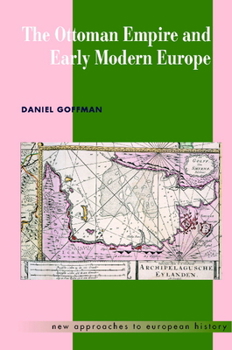The Ottoman Empire and Early Modern Europe
(Book #24 in the New Approaches to European History Series)
Select Format
Select Condition 
Book Overview
Despite the fact that its capital city and over one third of its territory was within the continent of Europe, the Ottoman Empire has consistently been regarded as a place apart, inextricably divided from the West by differences of culture and religion. A perception of its militarism, its barbarism, its tyranny, the sexual appetites of its rulers and its pervasive exoticism has led historians to measure the Ottoman world against a western standard...
Format:Paperback
Language:English
ISBN:0521459087
ISBN13:9780521459082
Release Date:May 2002
Publisher:Cambridge University Press
Length:300 Pages
Weight:1.14 lbs.
Dimensions:0.7" x 5.9" x 8.9"
Customer Reviews
2 ratings
Pass the Turkey, Please
Published by Thriftbooks.com User , 18 years ago
In The Ottoman Empire and Early Modern Europe, Daniel Goffman takes a fresh approach to explaining the relationship between Europe and the Ottoman Empire. He takes a dim view of earlier historians of the Ottoman Empire whom he accuses of being guilty of Orientalism. Goffman's goal in this book is to highlight the commonalities between the Ottoman Empire and the rest of Europe by investigating two aspects of the empire, the state's polity and its interactions with Western Europe. Perhaps the strangest aspect of this book is Goffman's attempt to bring a personal character to Ottoman studies. He introduces each chapter with a vignette from the life of a certain Kubad. These vignettes are meant to provide a narrative aspect to this work that is otherwise a survey. In looking at these glimpses of Kubad's life, Goffman takes certain liberties with his tale by fabricating details to fill the lacuna in Kubad's life. Though he notes when he is speculating, these flights of fancy may leave some historians uneasy. Ultimately, the perceived effectiveness of this technique is a matter of taste. Some people may appreciate the narrative and personal touch these vignettes provide, while others may find the work disjointed as it bounces between speculative biography and survey. In this book, Goffman proposes that historians cannot understand the history of Western Europe during the early modern period without addressing the Ottoman Empire. He writes, "It is thus not only reasonable--but quite fruitful--to conceive and study a "Greater Western World" which encompassed the followers of both Jesus and Mohammed" (8). In this book, Goffman investigates early modern Europe from an "Ottocentric" point of view. By doing this he emphasizes the commonalities between the Ottoman Empire and the rest of Europe and deemphasizes the ideological differences. Throughout the book, Goffman argues that during the early modern period, Europeans imagined the Ottoman Empire as being a part of the European community. They inherited this status from the Byzantine Empire and maintained it through their economic and political influence. According to Goffman, it was not until the late nineteenth century that Western Europe viewed the Ottomans as being outside the European sphere. Goffman has some convincing arguments, but he seems to downplay the religious divide too much. Instead of addressing the difference, he notes it and dismisses it. This dismissal might be justified, however, because Goffman is writing a corrective work rather than a holistic one. Though in affirming the common monotheism of Western Europe and the Ottoman Empire, Goffman himself seems guilty of Orientalism by placing the Taoist, Buddhists, and Hindus in a separate category. Ultimately, the book comes across as an extended defense of Turkey's bid to enter the European Union. Every page reiterates the historical place occupied by the Ottomans as a European state. Of course I might be reading too
Against Ottoman Black Legend
Published by Thriftbooks.com User , 22 years ago
I find in this book a good defence against the "Ottoman Black Legend", insisting that Turkey is also part of Europe, and showing that the Ottoman Empire was more alike to the present world than contemporary Christian societies, given that its degree of tolerance towards other people's religions and the ethnic compo-sition of its subjects was far greater and more varied than those of Christian Early Modern Europe. But I have the feeling that this book is not for beginners, but for those who already know about the Ottoman Empire and which wish to deepen their knowledge.I have rated it four starts. Considering its content, I think it should be five; conside-ring its readability, three.






